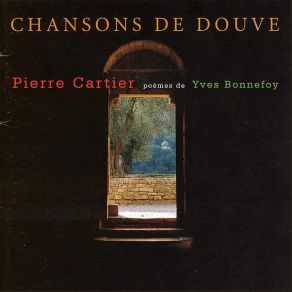Chansons de Douve
Download links and information about Chansons de Douve by Pierre Cartier. This album was released in 1998 and it belongs to Jazz, Rock, Alternative genres. It contains 14 tracks with total duration of 01:38:58 minutes.

|
|
|---|---|
| Artist: | Pierre Cartier |
| Release date: | 1998 |
| Genre: | Jazz, Rock, Alternative |
| Tracks: | 14 |
| Duration: | 01:38:58 |
| Buy it NOW at: | |
| Buy on iTunes $17.99 | |
Tracks
[Edit]| No. | Title | Length |
|---|---|---|
| 1. | Je Te Voyais | 14:17 |
| 2. | Présence Exacte | 3:35 |
| 3. | Que Saisir Sinon | 2:48 |
| 4. | Le Seul Témoin 1 | 5:45 |
| 5. | Le Seul Témoin 2 | 12:47 |
| 6. | Vrai Nom | 7:18 |
| 7. | Vrai Corps | 9:18 |
| 8. | Douve Parle (Passacaille) | 7:45 |
| 9. | Une Voix | 2:54 |
| 10. | Mais Que Se Taise | 5:40 |
| 11. | Je Prendrai Dans Mes Mains | 5:30 |
| 12. | Ainsi Marchons-Nous | 11:17 |
| 13. | Vrai Lieu (Chant De La Compassion) | 3:20 |
| 14. | Lieu De La Salamandre | 6:44 |
Details
[Edit]Pierre Cartier is a bassist based in Montréal. He has released a handful of records in the jazz spectrum like Dirigeable (an independant LP release) and Les Fleurs du Tapis (a CD on Ambiances Magnétiques), while being part of Jean Derome et les Dangeureux Zhoms and performing the music of Thelonious Monk with the trio Evidence (with Derome and drummer Pierre Tanguay). If these records showcased Pierre Cartier mostly as a jazzman, Chansons de Douve (Songs of Douve) reveals a very gifted composer. This two-CD set revolves around excerpts from Yves Bonnefoy's 1953 book Du Mouvement et de l'Immobilité de Douve (Of Movement and Stillness of Douve), stripped-down poems evoking presence and emptiness, the ghostly existence of a woman: Douve. These poems are sung by soprano Angèle Trudeau and mezzo-soprano Noëlla Huet, along with Cartier himself who also plays electric bass. The other musicians were mostly recruited from the Ambiances Magnétiques roster: Jean-Denis Levasseur (sax), Jean Derome (sax and flute), Ivanhoe Jolicoeur (trumpet), Sylvain Jacob (trombone), Tom Walsh (trombone), Pierre Tanguay (drums), and Julien Grégoire (percussion). The music maintains strong connections to chamber and small orchestra contemporary music spiced up with jazz. The influence of Philip Glass and Thelonious Monk are the most obvious. Other references would have to include Montréal guitarist Tim Brady, especially for his cycle Revolutionary Songs, written for his similar Bradyworks ensemble. The beauty emanating from the poems gets amplified through the music: textured moods, at times warm, at times disquieting. Impressive orchestral skills are enhanced by a soothing way of using dissonance. The usually self-effacing bassist has committed to CD an ambitious and strongly poetic work that deserves to be discovered. Strongly recommended. ~ François Couture, Rovi